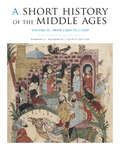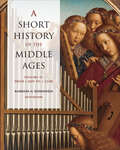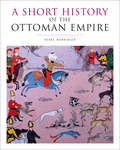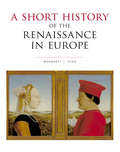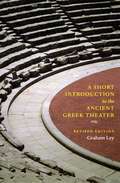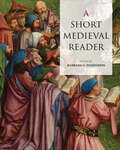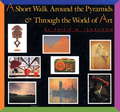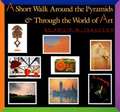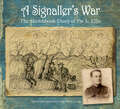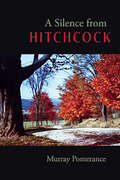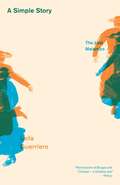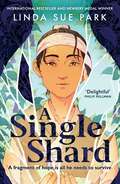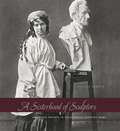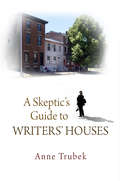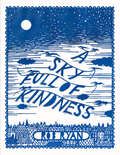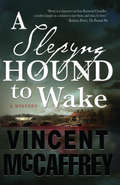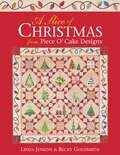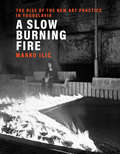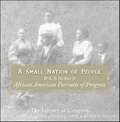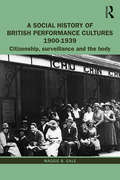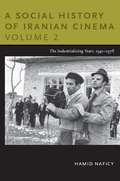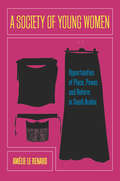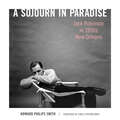- Table View
- List View
A Short History of the Middle Ages, Volume II: From c.900 to c.1500, Fourth Edition
by Barbara H. RosenweinBarbara H. Rosenwein's bestselling survey text continues to stand out by integrating the history of three medieval civilizations (European, Byzantine, and Islamic) in a lively narrative that is complemented beautifully by full-color plates, maps, and genealogies. The fourth edition begins with an essay entitled "Why the Middle Ages Matter Today," and the book now covers East Central Europe in some depth. New plates and maps have been added along with a new "Seeing the Middle Ages" feature. The sections for further reading have been updated, and ancillary materials, including study questions, can be found on the History Matters website (www.utphistorymatters.com).
A Short History of the Middle Ages, Volume II: From c.900 to c.1500, Sixth Edition
by Barbara RosenweinIn this new edition of A Short History of the Middle Ages, Barbara H. Rosenwein offers a panoramic view of the medieval world. Volume II ranges from England to China and from West Africa to the Baltic, while never losing sight of the main contours of the period c.900 to c.1500. The lively and informative narrative covers the major developments, political and religious movements, people, saints and sinners, economic and cultural changes, ideals, fears, and fantasies of the period in Europe, Byzantium, and the Islamic world. A comprehensive new map program, updated for the global reach of this edition, offers a way to visualize the era’s enormous political, economic, and religious changes. Line drawings make clear archaeological finds and architectural structures. All of the maps, genealogies, and figures in the book, as well as practice questions and suggested answers, are available at utphistorymatters.com.
A Short History of the Ottoman Empire
by Renée WorringerThe Ottoman Empire was a formidable force involved in European politics and commerce, yet it has not received its due in popular narratives of early modern history. In this beautifully illustrated overview, Renée Worringer provides a clear and comprehensive account of the Empire’s six-hundred-year history. Uncovering the strategies behind the longevity of the Ottoman Empire, the author highlights the Empire’s pragmatism and flexibility in governing over vast territories and diverse peoples. In full color throughout, A Short History of the Ottoman Empire uses clear headings, themes, text boxes, primary source translations, and maps to assist students in understanding the Empire’s complex and lengthy history.
A Short History of the Renaissance in Europe
by Margaret L. KingWriting about the Renaissance can be a daunting task. Not only do scholars disagree on what the Renaissance is, but they also disagree on whether or not it even took place. Margaret L. King's richly illustrated social history of the Renaissance succeeds as a trusted resource, introducing readers to Europe between 1300–1700, as well as to the problems of cultural renewal. A Short History of the Renaissance in Europe includes a detailed discussion of Burckhardt as well as new content on European contact with the Islamic world. This new edition also provides improved coverage of the Protestant and Catholic Reformations. "Focus" features provide fascinating insights into the Renaissance era, and "Voices" sections introduce a wealth of primary sources. King's engaging narrative is enhanced by over 100 images, statistical tables, timelines, a glossary, and suggested readings.
A Short Introduction to the Ancient Greek Theater
by Graham LeyContemporary productions on stage and film, and the development of theater studies, continue to draw new audiences to ancient Greek drama. With observations on all aspects of performance, this volume fills their need for a clear, concise account of what is known about the original conditions of such productions in the age of Pericles. Reexamining the surviving plays of Aeschylus, Sophocles, Euripides, and Aristophanes, Graham Ley here discusses acting technique, scenery, the power and range of the chorus, the use of theatrical space, and parody in their plays. In addition to photos of scenes from Greek vases that document theatrical performance, this new edition includes notes on ancient mime and puppetry and how to read Greek playtexts as scripts, as well as an updated bibliography. An ideal companion to The Complete Greek Tragedies, also published by the University of Chicago Press, Ley’s work is a concise and informative introduction to one of the great periods of world drama. "Anyone faced with Athenian tragedy or comedy for the first time, in or out of the classroom, would do well to start with A Short Introduction to Ancient Greek Theater."—Didaskalia
A Short Medieval Reader
by Barbara H. RosenweinA Short Medieval Reader contains the essential primary sources for exploring the Middle Ages in depth. Designed to both complement the sixth edition of A Short History of the Middle Ages and be used on its own, this book provides comprehensive readings ranging from Iceland to Egypt and from England to Iraq. Each source is clearly dated, and its original language is specified to remind students of the extraordinary diversity that existed in the Middle Ages. Introductions to each source supply the necessary context and are followed by questions to guide the reader. Annotations and explanations are provided. A Short Medieval Reader offers a feast for inquiring minds, priced for a student’s budget.
A Short Walk Around the Pyramids & Through the World of Art
by Philip M. IsaacsonFor art lovers and novices, the perfect introduction to the world of art in all its varied forms. <P><P>What do you consider a work of art? Is it a painting, a photograph, a sculpture? Or can it be so much more? <P>Philip Isaacson, the author of Round Buildings, Square Buildings & Buildings That Wiggle Like a Fish, explores the world of art and history and creates the perfect introduction for young readers to learn about the complex subject. With clear prose, Isaacson discusses abstract versus realism, the links between tribal art and modern sculpture, the use of color, and why some everyday objects and even cities can be considered art. <P>A Common Core Appendix B Text Exemplar Selection, Philip M. Isaacson's guide will inform as well as inspire. Includes full color photographs.
A Short Walk Around the Pyramids and Through the World of Art
by Philip M. IsaacsonIsaacson introduces art in all its forms: painting, sculpture, folk art, crafts--even cities. He discusses the differences between realism and abstraction, links between tribal art and modern sculpture, use of color by diverse artists, and why everyday objects can be works of art. [This text is listed as an example that meets Common Core Standards in English language arts in grades 6-8 at http://www.corestandards.org.]
A Signaller's War: The Sketchbook Diary of Pte L. Ellis
by David LangleyAs the First World War roared into its second year, 17-year-old Lawrence Ellis marched into his recruitment office and signed up, eager to fight for King and Country. Underage, as so many were, it wasn’t until he had cut his teeth in the Royal Field Artillery that Ellis joined the Corps of Royal Signallers. It was some years after the war, however, that the private began to commit his memories to art and words. A Signaller’s War includes a poignant selection of Ellis’ images, portraying the conditions, experiences and hopes of the common soldier in the trenches of the Western Front. Often humorous, sometimes horrific, always honest, this collection is a unique insight into the life of a young volunteer who grows from a boy to a man during his service, after witnessing the aftermath of the Somme and action at Cambrai. He was not a trained artist, writer or diarist, yet his work demonstrates a skill and sensitivity that will leave the reader breathless.
A Silence from Hitchcock
by Murray PomeranceIn A Silence from Hitchcock, Murray Pomerance explores the resonating power of silence in the director's work—its variation, its haunting temptation, and its technical power. Working from a meditative devotion to and an illuminating familiarity with the director's work, Pomerance shines light upon six films, some of them (Notorious, The Lady Vanishes, and The Trouble with Harry) frequently, even obsessively treated, and others (Frenzy, The Wrong Man, and Topaz) less often discussed. In its strange relation to speech, memory, urbanity, guilt, mortality, and espionage, silence becomes, in these films, a dramatic protagonist in its own right. Written by a master interpreter of Hitchcock, this book offers new ways of seeing, experiencing, and thinking about the films of one of cinema's greatest artists, as well as new ways of reflecting on our experience of cinema itself.
A Simple Story: The Last Malambo
by Leila Guerriero Frances RiddleObsession and mastery in their purest states: the story of one dancer’s attempt to win the biggest contest of his life. Every year, at the height of summer, the remote Argentine village of Laborde holds the national malambo contest. Centuries-old, this shatteringly demanding traditional gaucho dance is governed by the most rigid rules. And this festival has one stipulation that makes it unique: the malambo is danced for up to five minutes. That may seem like nothing, but consider the world record for the hundred-meter dash is 9.58 seconds. The dance contest is an obsession for countless young men, who sacrifice their bodies and money as they strive to become the champion, knowing that if they win—in order to safeguard the title’s prestige—they can never compete again. When Leila Guerriero traveled to Laborde, one dancer’s performance took her breath away, and she spent a year following him as he prepared for the next festival. The result is this superlative piece of journalism, told with tremendous economy and power.
A Single Shard: 'Delightful' Philip Pullman
by Linda Sue Park&‘Delightful... I read the novel with enormous pleasure and admiration.&’ PHILIP PULLMAN A SPECIAL 20TH ANNIVERSARY EDITION OF THIS AWARD-WINNING TALE ABOUT THE POWER OF PERSEVERANCE BY THE BESTSELLING AUTHOR OF A LONG WALK TO WATER 13-year-old Tree-ear lives in a Korean village famous for its ceramics. He doesn&’t have much but he loves to watch master potter Min at work and dreams of learning the craft one day. Reluctantly Min agrees to let Tree-ear help him. Determined to do whatever it takes to prove himself, Tree-ear embarks on a dangerous journey to present his master&’s work to the king, unaware it will change his life forever.
A Sisterhood of Sculptors: American Artists in Nineteenth-Century Rome
by Melissa DabakisThis project is made possible through support from the Terra Foundation for American Art.When Elizabeth Cady Stanton penned the Declaration of Sentiments for the first women’s rights convention, held in Seneca Falls, New York, in 1848, she unleashed a powerful force in American society. In A Sisterhood of Sculptors, Melissa Dabakis outlines the conditions under which a group of American women artists adopted this egalitarian view of society and negotiated the gendered terrain of artistic production at home and abroad. Between 1850 and 1876, a community of talented women sought creative refuge in Rome and developed successful professional careers as sculptors. Some of these women have become well known in art-historical circles: Harriet Hosmer, Edmonia Lewis, Anne Whitney, and Vinnie Ream. The reputations of others have remained, until now, buried in the historical record: Emma Stebbins, Margaret Foley, Sarah Fisher Ames, and Louisa Lander. At midcentury, they were among the first women artists to attain professional stature in the American art world while achieving international fame in Rome, London, and other cosmopolitan European cities. In their invention of modern womanhood, they served as models for a younger generation of women who adopted artistic careers in unprecedented numbers in the years following the Civil War.At its core, A Sisterhood of Sculptors is concerned with the gendered nature of creativity and expatriation. Taking guidance from feminist theory, cultural geography, and expatriate and postcolonial studies, Dabakis provides a detailed investigation of the historical phenomenon of women’s artistic lives in Rome in the mid-nineteenth century. As an interdisciplinary examination of femininity and creativity, it provides models for viewing and interpreting nineteenth-century sculpture and for analyzing the gendered status of the artistic profession.
A Sisterhood of Sculptors: American Artists in Nineteenth-Century Rome
by Melissa DabakisThis project is made possible through support from the Terra Foundation for American Art.When Elizabeth Cady Stanton penned the Declaration of Sentiments for the first women’s rights convention, held in Seneca Falls, New York, in 1848, she unleashed a powerful force in American society. In A Sisterhood of Sculptors, Melissa Dabakis outlines the conditions under which a group of American women artists adopted this egalitarian view of society and negotiated the gendered terrain of artistic production at home and abroad. Between 1850 and 1876, a community of talented women sought creative refuge in Rome and developed successful professional careers as sculptors. Some of these women have become well known in art-historical circles: Harriet Hosmer, Edmonia Lewis, Anne Whitney, and Vinnie Ream. The reputations of others have remained, until now, buried in the historical record: Emma Stebbins, Margaret Foley, Sarah Fisher Ames, and Louisa Lander. At midcentury, they were among the first women artists to attain professional stature in the American art world while achieving international fame in Rome, London, and other cosmopolitan European cities. In their invention of modern womanhood, they served as models for a younger generation of women who adopted artistic careers in unprecedented numbers in the years following the Civil War.At its core, A Sisterhood of Sculptors is concerned with the gendered nature of creativity and expatriation. Taking guidance from feminist theory, cultural geography, and expatriate and postcolonial studies, Dabakis provides a detailed investigation of the historical phenomenon of women’s artistic lives in Rome in the mid-nineteenth century. As an interdisciplinary examination of femininity and creativity, it provides models for viewing and interpreting nineteenth-century sculpture and for analyzing the gendered status of the artistic profession.
A Skeptic's Guide to Writers' Houses
by Anne TrubekThere are many ways to show our devotion to an author besides reading his or her works. Graves make for popular pilgrimage sites, but far more popular are writers' house museums. What is it we hope to accomplish by trekking to the home of a dead author? We may go in search of the point of inspiration, eager to stand on the very spot where our favorite literary characters first came to life--and find ourselves instead in the house where the author himself was conceived, or where she drew her last breath. Perhaps it is a place through which our writer passed only briefly, or maybe it really was a longtime home--now thoroughly remade as a decorator's show-house.In A Skeptic's Guide to Writers' Houses Anne Trubek takes a vexed, often funny, and always thoughtful tour of a goodly number of house museums across the nation. In Key West she visits the shamelessly ersatz shrine to a hard-living Ernest Hemingway, while meditating on his lost Cuban farm and the sterile Idaho house in which he committed suicide. In Hannibal, Missouri, she walks the fuzzy line between fact and fiction, as she visits the home of the young Samuel Clemens--and the purported haunts of Tom Sawyer, Becky Thatcher, and Injun' Joe. She hits literary pay-dirt in Concord, Massachusetts, the nineteenth-century mecca that gave home to Hawthorne, Emerson, and Thoreau--and yet could not accommodate a surprisingly complex Louisa May Alcott. She takes us along the trail of residences that Edgar Allan Poe left behind in the wake of his many failures and to the burned-out shell of a California house with which Jack London staked his claim on posterity. In Dayton, Ohio, a charismatic guide brings Paul Laurence Dunbar to compelling life for those few visitors willing to listen; in Cleveland, Trubek finds a moving remembrance of Charles Chesnutt in a house that no longer stands.Why is it that we visit writers' houses? Although admittedly skeptical about the stories these buildings tell us about their former inhabitants, Anne Trubek carries us along as she falls at least a little bit in love with each stop on her itinerary and finds in each some truth about literature, history, and contemporary America.
A Sky Full of Kindness
by Rob RyanRob Ryan's papercut prose is so exquisitely intricate, it begs closer examination—and always captures a lingering eye. The story Ryan tells in this jacketed hardcover is a celebration of love and family just as heartfelt as it is visually arresting: two songbirds eagerly anticipate the arrival of their first child, and as they tend to their nest, they can't help but worry about becoming parents. It's the generosity and support of their avian friends and neighbors that confirms the world awaiting their unborn chick is indeed full of kindness. Brimming with poetic verse, each page is a work of art that will charm new parents and longtime fans of Ryan's evocative imagery.
A Slepyng Hound to Wake
by Vincent MccaffreyPraise for Hound:"There's something charismatic and timeless about the way the story builds and McCaffrey opens Henry's life to the reader . . . McCaffrey is. . .just telling a compelling, old-school yarn, the kind of story a man who knows his literature tells."-Time Out Chicago"For the true bibliophile, this is a book you'll love."-The HippoGeoffrey Chaucer said, "It is nought good a slepyng hound to wake." Henry Sullivan, bookhound, is ready to be that sleeping dog: to settle down in his new apartment and enjoy life with his new girlfriend.But the underside of the literary world won't let him go. A bookscout sells Henry a book-and is murdered later that night. An old friend asks him to investigate a case of possible plagiarism involving a local best-selling author. To make matters worse, his violinist neighbor seems to have a stalker. And wherever Henry goes, there's a cop watching him.Henry can read the signs: to save those he loves he has to save himself.Vincent McCaffrey's novel Hound was chosen as a Must-Read Book by the Massachusetts Book Awards. He has owned the Avenue Victor Hugo Bookshop for more than thirty years. He has been paid to do lawn work, shovel snow, paint houses, and to be an office-boy, warehouse grunt, dishwasher, waiter, and hotel night clerk. He has chosen at various times to be a writer, editor, publisher, and bookseller. A Slepyng Hound to Wake is his second novel.
A Slice of Christmas from Piece O' Cake Designs
by Becky Goldsmith Linda JenkinsCelebrate a very special Christmas with Piece O’ Cake Designs! Designers Linda Jenkins and Becky Goldsmith present a collection of their best-loved applique Christmas quilts and more, so you can fill your home with handmade treasures for the holidays. • 7 sparkling Christmas projects include quilts, stockings, tree skirts, and a table runner - mix and match patterns for even more projects! • Designs feature a retro ‘50s Santa, Christmas trees, and Santa sampler from past favorites “A Piece O’ Cake Christmas” and “A Sampling of Santas” (out of print), plus a NEW poinsettia design • Choose from hand or machine applique - includes instructions for both • Projects offer a range of skill levels from confident beginner to advanced applique artist
A Slow Burning Fire: The Rise of the New Art Practice in Yugoslavia
by Marko IlicYugoslavia's diverse and interconnected art scenes from the 1960s to the 1980s, linked to the country's experience with socialist self-management.In Yugoslavia from the late 1960s to the late 1980s, state-supported Student Cultural Centers became incubators for new art. This era's conceptual and performance art--known as Yugoslavia's New Art Practice--emerged from a network of diverse and densely interconnected art scenes that nurtured the early work of Marina Abramović, Sanja Iveković, Neue Slowenische Kunst (NSK), and others. In this book, Marko Ilić offers the first comprehensive examination of the New Art Practice, linking it to Yugoslavia's experience with socialist self-management and the political upheavals of the 1980s.
A Small Nation of People: W. E. B. Du Bois and African American Portraits of Progress
by David Levering Lewis Deborah WillisAn incredible treasure trove of more than 150 illustrations detailing a small nation of African Americans prepared to make their mark on America
A Small Town Love Story: Colonial Beach, Virginia
by Sherryl WoodsPart memoir, part oral history, #1 New York Times bestselling author Sherryl Woods gives us a rare and intimate look at Colonial Beach, Virginia.Rich in narrative history and local color, A Small Town Love Story: Colonial Beach, Virginia is an homage to the town of Sherryl Woods’s summers, a place that stole her heart long ago and provided the basis for the many fictional small towns in her bestselling novels.True to Woods’s signature style of focusing on characters who are at the center of their communities, here she has woven together the stories of the very real people who helped shape this seaside Virginia town. She takes us back to the days of her own family gatherings, artfully capturing the unique essence of Colonial Beach and making us yearn for small-town life.Woods’s own memories frame the true stories she features—from the unique history of Colonial Beach itself to some firsthand accounts of the Oyster Wars that once consumed the community, to the stories of neighborhood merchants who made it a point to know just about every customer by name. From farmers to restauranteurs and hoteliers, from pastors to librarians and military folk, Woods’s research and interviews give life to the personalities of a very special place.
A Social History of British Performance Cultures 1900-1939: Citizenship, surveillance and the body
by Maggie B. GaleThis book provides a new social history of British performance cultures in the early decades of the twentieth century, where performance across stage and screen was generated by dynamic and transformational industries. Exploring an era book-ended by wars and troubled by social unrest and political uncertainty, A Social History of British Performance Cultures 1900–1939 makes use of the popular material cultures produced by and for the industries – autobiographies, fan magazines and trade journals, as well as archival holdings, popular sketches, plays and performances. Maggie B. Gale looks at how the performance industries operated, circulated their products and self-regulated their professional activities, in a period where enfranchisement, democratization, technological development and legislation shaped the experience of citizenship. Through close examination of material evidence and a theoretical underpinning, this book shows how performance industries reflected and challenged this experience, and explored the ways in which we construct our ‘performance’ as participants in the public realm. Suited not only to scholars and students of British theatre and theatre history, but to general readers as well, A Social History of British Performance Cultures 1900–1939 offers an original intervention into the construction of British theatre and performance histories, offering new readings of the relationship between the material cultures of performance, the social, professional and civic contexts from which they arise, and on which they reflect.
A Social History of Iranian Cinema: The Industrializing Years, 1941-1978
by Hamid NaficyHamid Naficy is one of the world's leading authorities on Iranian film, and A Social History of Iranian Cinema is his magnum opus. Covering the late nineteenth century to the early twenty-first and addressing documentaries, popular genres, and art films, it explains Iran's peculiar cinematic production modes, as well as the role of cinema and media in shaping modernity and a modern national identity in Iran. This comprehensive social history unfolds across four volumes, each of which can be appreciated on its own. Volume 2 spans the period of Mohammad Reza Shah's rule, from 1941 until 1978. During this time Iranian cinema flourished and became industrialized, at its height producing more than ninety films each year. The state was instrumental in building the infrastructures of the cinema and television industries, and it instituted a vast apparatus of censorship and patronage. During the Second World War the Allied powers competed to control the movies shown in Iran. In the following decades, two distinct indigenous cinemas emerged. The more popular, traditional, and commercial filmfarsi movies included tough-guy films and the "stewpot" genre of melodrama, with plots reflecting the rapid changes in Iranian society. The new-wave cinema was a smaller but more influential cinema of dissent, made mostly by foreign-trained filmmakers and modernist writers opposed to the regime. Ironically, the state both funded and censored much of the new-wave cinema, which grew bolder in its criticism as state authoritarianism consolidated. A vital documentary cinema also developed in the prerevolutionary era. A Social History of Iranian CinemaVolume 1: The Artisanal Era, 1897-1941 Volume 2: The Industrializing Years, 1941-1978 Volume 3: The Islamicate Period, 1978-1984 Volume 4: The Globalizing Era, 1984-2010
A Society of Young Women: Opportunities of Place, Power, and Reform in Saudi Arabia
by Amélie Le RenardThe cities of Saudi Arabia are among the most gender segregated in the world. In recent years the Saudi government has felt increasing international pressure to offer greater roles for women in society. Implicit in these calls for reform, however, is an assumption that the only "real" society is male society. Little consideration has been given to the rapidly evolving activities within women's spaces. This book joins young urban women in their daily lives—in the workplace, on the female university campus, at the mall—to show how these women are transforming Saudi cities from within and creating their own urban, professional, consumerist lifestyles. As young Saudi women are emerging as an increasingly visible social group, they are shaping new social norms. Their shared urban spaces offer women the opportunity to shed certain constraints and imagine themselves in new roles. But to feel included in this peer group, women must adhere to new constraints: to be sophisticated, fashionable, feminine, and modern. The position of "other" women—poor, rural, or non-Saudi women—is increasingly marginalized. While young urban women may embody the image of a "reformed" Saudi nation, the reform project ultimately remains incomplete, drawing new hierarchies and lines of exclusion among women.
A Sojourn in Paradise: Jack Robinson in 1950s New Orleans
by Howard Philips SmithJack Robinson made his name as a much-sought-after fashion and celebrity photographer during the 1960s and early 1970s, and his work is well documented in hundreds of pages of Vogue, the New York Times, and Life, as well as other publications. However, his personal life remains virtually unknown. In this study of Robinson and his photography, Howard Philips Smith takes an in-depth look at Robinson’s early life in New Orleans, where he discovered his passion for painting, photography, and the Dixie Bohemian life of the French Quarter. A Sojourn in Paradise: Jack Robinson in 1950s New Orleans features more than one hundred photographs taken by the artist, accompanied by detailed commentary about Robinson’s life in New Orleans and excerpts from interviews with the people who knew him when he lived there. Robinson’s photographs of New Orleans reveal the genesis of two unique and fascinating facets of the city’s history and culture: the creation of the first gay Carnival krewes who would make their own unique contribution to the rich cultural history of the city and the formation of the Orleans Gallery, one of the earliest centers of the contemporary art movement blossoming in 1950s America. This detailed study of Jack Robinson’s early life and photography illustrates the contributions of a gifted, gay artist whose quiet spirit and constant interior struggle found refuge in New Orleans, the city where he was able to find himself, for a time, free from society’s grip and open to exploring life on his own terms.
